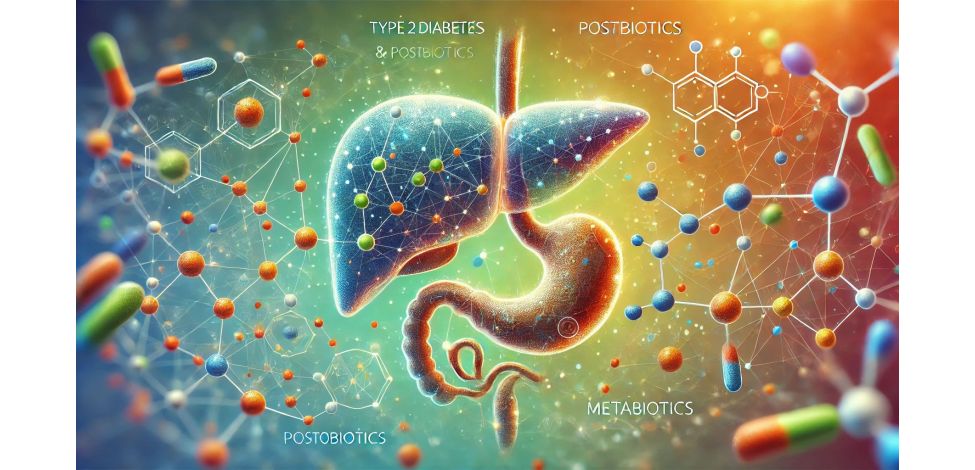How Metabiotics and Postbiotics Can Improve Type 2 Diabetes and Fatty Liver Disease
Metabiotics and postbiotics are promising areas in the treatment of type 2 diabetes mellitus (T2DM) and non-alcoholic fatty liver disease (NAFLD). Their use is based on the ability to modulate the intestinal microbiota and, as a result, influence the metabolic processes associated with these diseases.
The role of intestinal microbiota in the pathogenesis of T2DM and NAFLD
Gut microbiota plays a key role in maintaining metabolic homeostasis. Dysbiosis, or microbiota imbalance, is associated with the development of insulin resistance, obesity, and inflammatory processes that contribute to the progression of T2DM and NAFLD. Research suggests that changes in the composition of the microbiota can affect the permeability of the intestinal barrier, promoting the translocation of endotoxins into the systemic circulation and causing chronic inflammation. This, in turn, worsens insulin sensitivity and promotes fat accumulation in the liver.
Metabiotics and postbiotics: definition and mechanisms of action
Metabiotics and postbiotics are products of the metabolic activity of probiotic microorganisms that do not contain living cells. They include short-chain fatty acids (SCFA), peptides, polysaccharides, cellular components and other biologically active substances. They are able to modulate the immune response, reduce inflammation, improve the intestinal barrier function and affect glucose and lipid metabolism. Unlike probiotics, metabiotics and postbiotics have stability and predictability of action, which makes them attractive for therapeutic use.
Impact on type 2 diabetes
The use of metabiotics and postbiotics in T2DM is aimed at improving glycemic control and reducing insulin resistance. SCFAs such as butyrate, propionate, and acetate, formed as a result of fermentation of dietary fiber by microbiota, improve insulin sensitivity and stimulate the secretion of incretins, which helps reduce blood glucose levels. In addition, they have anti-inflammatory properties, reducing systemic inflammation associated with insulin resistance. Studies show that the use of Bacillus subtilis-based metabiotics helps reduce blood glucose levels and improve the overall metabolic profile in patients with T2DM.
Impact on non-alcoholic fatty liver disease
NAFLD is characterized by excessive accumulation of fat in the liver, unrelated to alcohol consumption, and is often accompanied by inflammation and fibrosis. Intestinal dysbiosis and increased intestinal barrier permeability play a significant role in the pathogenesis of NAFLD. Metabiotics and postbiotics can help restore the balance of microbiota, strengthen the intestinal barrier, and reduce blood endotoxins, which leads to a decrease in liver inflammation. The use of Bacillus subtilis-based metabiotics has shown effectiveness in reducing liver steatosis and inflammation in patients with NAFLD.
Clinical studies and application prospects
A number of clinical studies confirm the effectiveness of metabiotics and postbiotics in the treatment of T2DM and NAFLD. For example, a study published in the journal Experimental and Clinical Gastroenterology showed that the use of the metabiotic Bactimunal based on Bacillus subtilis in patients with NAFLD leads to a significant improvement in liver function indicators and a decrease in the degree of steatosis.
Conclusion
Metabiotics and postbiotics are a promising direction in the complex therapy of type 2 diabetes mellitus and non-alcoholic fatty liver disease. Their ability to modulate intestinal microbiota and influence metabolic processes opens up new opportunities for improving the condition of patients. However, before starting to use such agents, it is necessary to conduct a thorough assessment and consultation with a doctor for an individual selection of optimal therapy.
Research links:
-
Dudanova O. P., Larina N. A., Shipovskaya A. A., Kurbatova I. V. Efficiency of the metabiotic Baktimunal (based on Bacillus subtilis) in non-alcoholic fatty liver disease. Experimental and Clinical Gastroenterology. 2023;216(8):93–99.
-
Ibragimova L.I., Kolpakova E.A., Dzagakhova A.V., Egshatyan L.V., Pokrovskaya E.V., Derevyanko O.S., Nikonova T.V. The role of intestinal microbiota in the development of type 1 diabetes mellitus. Diabetes mellitus. 2021;24(1):62-69.
-
Prebiotics, probiotics, synbiotics, parabiotics

